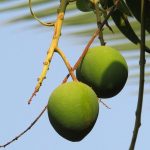In the vast tapestry of the plant kingdom, the African mango, or Irvingia gabonensis, stands out as an enigmatic superfruit with a captivating story to tell. This peculiar fruit, native to the rainforests of West and Central Africa, has long been a staple in traditional medicine, but it has only recently gained recognition for its potential health benefits beyond its culinary uses. Join us on a delightful journey as we unravel the secrets of the African mango, its unique properties, and the humorous anecdotes surrounding this fascinating fruit.
The African mango is a remarkable fruit that resembles a small mango. Its outer skin is smooth and varies in color from green to orange, depending on its ripeness. Inside, the flesh is a vibrant orange hue and surrounds a large, hard seed. The taste of the African mango is often described as a cross between a mango and an apricot, with a sweet, slightly tart flavor.
Beyond its culinary appeal, the African mango has gained attention for its potential health benefits. Studies suggest that the fruit may have anti-inflammatory, antioxidant, and weight loss properties. The seed of the fruit is particularly rich in a compound called Irvingia gabonensis extract (IGE), which has been linked to several health benefits.
IGE has been shown to have anti-inflammatory properties, which may help reduce inflammation throughout the body. Inflammation is a common factor in many chronic diseases, such as heart disease, cancer, and arthritis. By reducing inflammation, IGE may help protect against these diseases and improve overall health.
In addition to its anti-inflammatory properties, IGE has also been shown to have antioxidant properties. Antioxidants are compounds that help protect cells from damage caused by free radicals. Free radicals are unstable molecules that can damage cells and contribute to aging and disease. IGE has been shown to neutralize free radicals, which may help protect cells from damage and slow down the aging process.
Perhaps the most intriguing aspect of the African mango is its potential role in weight loss. Studies have shown that IGE may help promote weight loss by reducing appetite, increasing metabolism, and blocking the absorption of fat. IGE has also been shown to help regulate blood sugar levels, which may help prevent weight gain and improve overall metabolic health.
Despite its potential health benefits, the African mango is not without its humorous side. One of the most common anecdotes surrounding the fruit is its ability to induce flatulence. The fruit contains a high amount of dietary fiber, which can be difficult for some people to digest. As a result, consuming too much African mango can lead to uncomfortable gas and bloating. However, this side effect can be minimized by consuming the fruit in moderation and gradually increasing the amount over time.
Another humorous anecdote about the African mango is its use as a traditional aphrodisiac in some cultures. The fruit is believed to have properties that can enhance sexual desire and performance. While there is no scientific evidence to support this claim, it adds an amusing touch to the lore of the African mango.
In conclusion, the African mango is a fascinating superfruit with a unique and enigmatic history. Its potential health benefits, ranging from anti-inflammatory to antioxidant and weight loss properties, make it an intriguing natural remedy. However, it is important to note that more research is needed to fully understand the effects of the African mango and its long-term safety. If you are considering incorporating the African mango into your diet, it is always best to consult with a healthcare professional first.

